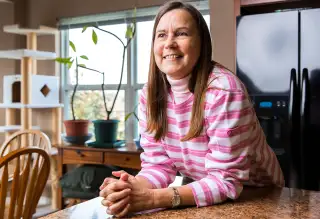How to Pull Off a Career Shift in Your 50s

Mary Foster is a morning person, which helps make the 5 a.m. start time at her job as a manager at a young food-flavoring company a little easier. Still, the 60-hour work weeks she regularly puts in have started to wear on her.
So much so that the 57-year-old Kentucky resident is contemplating a big change around age 60: She would like to shift to a lower-stress job working 35 to 40 hours a week, even if that requires taking a pay cut. She would also like the job to be in the area where she hopes to retire. That’s Central Florida, with its mild winters and proximity to Disney World, her favorite vacation destination.
Foster wants to build a house on a few acres of land where she and her cat, growing up on a Maryland farm. But she is concerned about whether her $800,000-plus nest egg is big enough and how to proceed to make this transition toward retirement a reality.
Making the Numbers Work
From her $121,000 salary, Foster is squirreling away the maximum $24,000 in her 401(k)—including catch-up contributions for those 50 and older—plus $8,400 in other accounts. Orlando financial planner Cary Carbonaro, author of The Money Queen’s Guide, is confident Foster can afford the job change she wants and a comfortable annual retirement budget of $70,000 (in today’s dollars) if she keeps up her current saving rate for now and then times her moves right.
Foster will need to earn at least $70,000 a year from age 60 to 65. At any lower pay, Carbonaro worries that Foster would have to dip into her nest egg early, which Foster is also against. “I want my savings to continue to grow and not have to use it for the next few year—or more,” she says.
Carbonaro says Foster should wait to move to Florida until she has a new job locked down. To stay within her budget, the planner suggests Foster spend no more than $225,000 on a home, and she urges her to buy an existing house. “I’ve never had a client stay on time or within budget when building,” the planner says.
Foster isn’t ready to eschew building. She’ll consider both options and choose based on location, lot size, and price. “I’ve had a house built for me once before. I know what it is like,” she says.
Carbonaro says Foster’s portfolio needs a makeover because the investing novice “is in very complicated products and doesn’t need to be.” Those include managed accounts at a brokerage for which she pays fees of 0.86% a year plus significant fund expenses—without getting much individualized advice. Carbonaro says Foster should look for another adviser who might charge lower fees and use low-cost funds and individual securities, for a combined cost of 1% or less.
Foster might have done better leaving money in a former employer’s 401(k) plan, not rolling it into IRAs, the planner adds. “I hate to hear that I’ve spent more than I’ve needed to,” says Foster. She isn’t sure about the need for a complete overhaul but will start by asking more questions of her broker.
Scaling Back at Work
When Foster starts looking for her transition-to-retirement job, she should be prepared for some skepticism from potential employers, says Marc Miller, author of Repurpose Your Career: A Practical Guide for Baby Boomers. “Anytime you try to move down the ladder, especially for a lower-paid position, no one believes you,” he says. “The assumption is that you’ll move on as soon as a higher-paying offer comes in.”
The good news: Foster’s 28-year history in her field, including a stint as president of the Society of Flavor Chemists, means she has a vast network of people she can tap to help her find openings as well as to vouch for her sincerity. “Reach out to all your contacts” and also use LinkedIn to make new connections at potential Florida employers, Miller says. “Ask them about the company, its culture, how stressful the job is,” he says.
Stress and long hours are endemic at young companies, Miller notes; he says Foster just might be able to find a less stressful job without a step down the ladder. “That’s a good point,” says Foster. “If the work hours changed, I’d be very happy to stay in a role like my current one.”